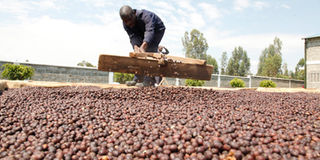What will change after UK’s divorce from EU?

A man spreads out coffee beans on a farm. Coffee beans are among Uganda’s agricultural exports to United Kingdom. Photo by Racheal Mabala
On the night of January 31, 2020, United Kingdom (UK) ceased to be a member of the European Union (EU) after about 47 years, leaving EU with 27 member states.
The UK has now entered an 11-month transition period until December 2020.
Speaking on the night of exit, UK Prime Minister Boris Johnson said: “Tonight, we are leaving the European Union. For many people, this is an astonishing moment of hope, a moment they thought would never come. And there are many of course who feel a sense of anxiety and loss.
And then of course there is a third group – perhaps the biggest – who had started to worry that the whole political wrangle would never come to an end.”
But how will this ‘EU divorce’ affect Uganda?
Some economists believe UK’s interest in trade matters will continue while UK support to Uganda in form of development aid will continue given its historical background with Uganda.
Impact on aid
In an interview with Prosper Magazine, a research fellow at Economic Policy research Centre (EPRC), Mr Corti Paul Lakuma, said: “Brexit may affect the flow of aid to Uganda through various channels.
First, the UK was the third-largest contributor to the European Development Fund (EDF), behind Germany and France. It follows that nearly 60 per cent of the UK’s official development aid has been provided through bilateral means while the remainder is channeled through multilateral agencies or partners (such as the EU).”
Mr Lakuma said Brexit will, therefore, have the effect of causing UKAID/ DFID to refocus 100 per cent of development aid towards its national priorities and interests.
“This arrangement suggests that aid to Uganda from the UK will increase. However, it also means aid to Uganda from the EU may reduce. What remains to be established is the magnitude of reduction in EU aid to Uganda,” he said.
Mr Lakuma said the second channel is that the UK will lose preferential market access to the EU, leading to increased trade costs, a depreciation of the UK currency associated with a fall in British imports. As a consequence, this can have a ripple effect of reduction reallocation of UK foreign aid expenditure.
Largest single market
The European Union – the world’s largest single market area – is one of the most outward-oriented economies in the world. Free trade among its members was one of the EU’s founding principles, and it is committed to opening up world trade as well.
The EU actively engages with countries or regional groupings to negotiate trade agreements. These agreements grant mutually-beneficial access to the markets of both the EU and the countries concerned.
The UK was a member of the EU for 47 years and countries like Uganda trade with EU as a bloc although they can also trade bilaterally.
Dr Muhumuza said: “We may have to change some of the trade agreements that were based on the EU to customise them to the UK in case of need. Otherwise, nothing much to worry about at this point in time.”
UK-Africa Summit
The UK-Africa Investment Summit on 20 January 2020 laid the foundations for new partnerships between the UK and African nations based on trade, investment, shared values and mutual interest. Billions of pounds of new commercial deals were announced highlighting the strength of the UK’s offer and existing relationship with Africa.
Impact of brexit
The UK trade with EU constitutes 49 per cent, with the rest of the world 40 per cent and 11 per cent with countries with the EU trade agreement. In terms of trade, Mr Lakuma said Uganda will bear a low cost of Brexit because it signed a continuity agreement with the UK.
“This will support Uganda’s exports to remain stable or reduce less significantly than countries that have not signed the agreement such as Ghana. However, a no – deal Brexit will reduce Uganda’s exports by as much as 20 per cent,” he said.
The UK is one of Uganda’s active development partners, providing aid to Uganda through Department for International Development to support the country’s economic development initiatives in social sectors of the economy.
Dr Fred Muhumuza, a lecturer at the School of Economics and Management at Makerere University told Prosper that there is likely to be little change in Uganda because UK has been involved in Uganda’s development programmes.
“Not much really given the historical relationships and nature of trade between us that is limited to a few enterprises, except for tourism and few agric crops. However, we might see Britain increase interest and possible support through DFID.”



